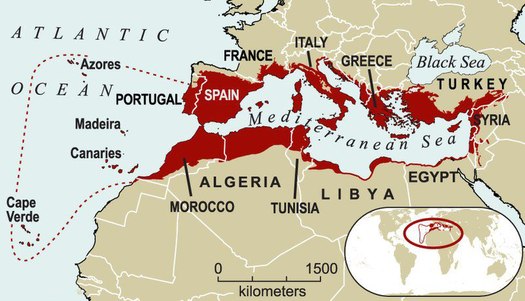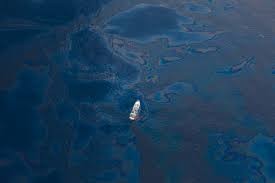In ‘Alice in Wonderland’ Alice looks down at her feet and discovers that her feet are almost out of sight. She says: `Oh, my poor little feet, I wonder who will put on your shoes and stockings for you now, dears? I’m sure I shan’t be able! I shall be a great deal too far off to trouble myself about you: you must manage the best way you can … ‘
This reminds me of the European Union’s leaders’ scant attention to the Mediterranean and Africa, with their head in the prosperous North and the poor legs, far away in the south. Since the EU’s enlargement to the East, most of its agenda has been taken up by issues of its Eastern Neighbourhood. Its new focus on the Indo-Pacific will stretch the EU away from the Mediterranean and Africa more and more.
Southern Europe continues to be poorer than Northern Europe. If the political leadership in the capitals of EU member states largely ignore the predicament of their southern regions, how can they take seriously other regions, further south, in the Mediterranean and Africa?
We are 27 member states in the EU. Nine of us are considered to be Mediterranean countries. But is that really so? Of the 27, only Malta and Cyprus are surrounded totally by the Mediterranean Sea. Only Malta, Greece and Cyprus have 80% of their population living on the coast of the Mediterranean. 70% of Italians, 40% of Croatians and Spanish, 20% of French citizens live on the Mediterranean Coast.
With this kind of geographical, demographic and economic reality where the epicentre of the EU is “far away” from the Mediterranean, no wonder that it is a big struggle to put the Mediterranean and Africa on the EU’s agenda in a meaningful and consistent manner. EU Commission Presidents like Romano Prodi and Jean-Claude Juncker tried to reset the relations between the two continents, but they were disappointed that very little progress was achieved. Just before leaving office in Brussels, Prodi admitted that he had problems persuading his colleagues that the EU should support the birth and development of the African Union.
Six years ago in Vienna, Juncker warned that “Africa’s future will shape Europe’s destiny.” He acknowledged that Europe was too late in discovering business investment opportunities in Africa and urged European firms to boost their investments in Africa in a “partnership among equals,” reminding the joint European Union and Africa Union forum that Africa’s population was forecast to double to 2.5 billion by 2050.
The climate emergency is making the situation worse as desertification spreads and millions are displaced as they have to abandon their agricultural lands. While the population continues to increase, there is less land to provide them with food. Even the new steps that European governments had to take to replace Russian gas and oil with supplied from Africa, the structural relationship remains the same with the EU importing primary products and keeping manufactured goods away.
Although the EU is Africa’s largest trade and investment partner, our political presence is very weak. At the EU-AU summit in Kigali in October 2021, the African Foreign Affairs Ministers turned up in full force, only a minority of Foreign Affairs Ministers from the EU bothered to attend. The political message of the absences was very clear.
The African population has reached almost 1.5 billion (with a fertility rate of 4.1), more than treble the population of the European Union of 448 million (with a fertility rate of 1.5). 60% of the African population is under 24 years of age. Yet the EU continues to largely ignore its southern neighbour.
Coups d’etat from April 2019 to July 2023 have shown Mali, Sudan, Guinea, Chad, Burkina Faso and Niger turning not only against France but also against the EU which has lost its global geopolitical centrality. Former European Commission President Romano Prodi has called for an urgent well-planned summit to be held between the EU and Africa that: “must be specific and between equals, where there is a break with the past and where no country will try to dominate the rest. Or do we prefer to wait for the next coup, that will be the last, as in the Sahel, there is hardly anyone left siding with the West.” (Il Messaggero 29 July 2023).
Prodi augurs that the disintegration of the former French colonial empire “(makes way) … for a coordinated European presence in Africa. The EU remains the major donor to Africa but without a unified strategy and so unable to achieve any concrete outcomes.”
The EU’s asymmetrical trade relationship with Africa has not changed since the 1960s. The EU’s imports from Africa are made up of fossil fuels (40.7%) and other primary commodities (ores, metals, and other minerals together accounting for 14.2% of the total) as well as food items (15.7%). The EU is Africa’s most important trading partner. The EU accounts for 26 percent of all imports in terms of value into African countries The EU is also Africa’s most important investor, but EU investments are also concentrated in the mining sector, including fossil fuels. If it were to get its act together through a comprehensive continental approach instead of EU member states continuing to go it alone (separate from and also against) each other, the EU would have great beneficial economic leverage on how the economy develops in African countries.
The African continent accounts for just 2 percent of the EU’s trade (in terms of imports and exports); so the policy decisions of the EU matter considerably to Africa, but that of the African continent matters relatively little to the EU. The EU is being very short sighted in not engaging more with Africa leaving the field open to other countries who have the advantage of not being tainted with the colonial legacy of the major European countries.
African countries know their history. They suffered a great deal through Western colonialism and are still feeling its devastating effects. They lived through the Cold War where coups d’etat and the assassination of African leaders who wanted to liberate their countries and nationalise their resources for the benefit of their people, and support for the South African Apartheid regime and military dictators were justified on the grounds that they prevented the spread of Soviet-backed communism on the African continent.
What Mario Giro: former deputy minister for foreign affairs of Italy: (Italian Institute for International Political Studies, 3 August 2023) recommends a whole EU partnership approach to Africa:
“A more structured policy should therefore aim at defending the resilience of sub-Saharan states … through a policy to support the stability of states in terms of security cooperation, law enforcement collaboration, intelligence exchanges, and military cooperation, provided it is preventive in nature… This security policy must be combined with a long-term economic project that includes: “double taxation, technological cooperation, and transfer of production, particularly agricultural production. Africa must be able to produce and process its raw materials (agricultural and mining), at least at an early stage in the chain of production. The commodity rent economy is no longer sufficient; rather, it has become unappealing to the populations themselves, who see it as embedded intoexploitation, paternalism and neo-colonialism… African countries must become real partners in their own development. An African agri-food industry must be created, even at some cost to the European Common Agricultural Policy.”
Other areas where the EU and the African Union can work together through a reciprocal comprehensive continental approach should also extend to education, energy, tourism, construction, infrastructure but also services. Presently services ranging from banking and insurance to transport – are largely missing from Europe’s trade and development cooperation agenda with Africa.
European trade policy towards Africa remains at odds with the publicly expressed intention to champion the African Continental Free Trade Area (AfCFTA) -led integration of the African continent. The EU’s fragmented trade regimes result in hard borders for EU trade between African countries within the same customs union at the regional level. It is difficult to see how a continental customs union could emerge from the divisions created by the EU. In his LSE blog, David Luke (May 26, 2023) suggests that “To get out of the muddle, a good development case can be made for the EU to grant unilateral market access that is duty-free and quota-free to all African countries, with a unified rules of origin regime for a transitional period benchmarked against milestones in AfCFTA implementation and the gains emerging from it. This will require multilateral legitimisation through a World Trade Organization (WTO) waiver… this should not be an insurmountable feat.”
The EU and AU should also introduce a circular system of migration: Africans coming to train in EU states and also to work there for a set period, then returning home with the possibility to return for specialisation and so on.
If the EU stays away from involving itself in Africa’s development, there is a very real risk that the continent will not only develop without the EU but that it will actually develop against the EU.




